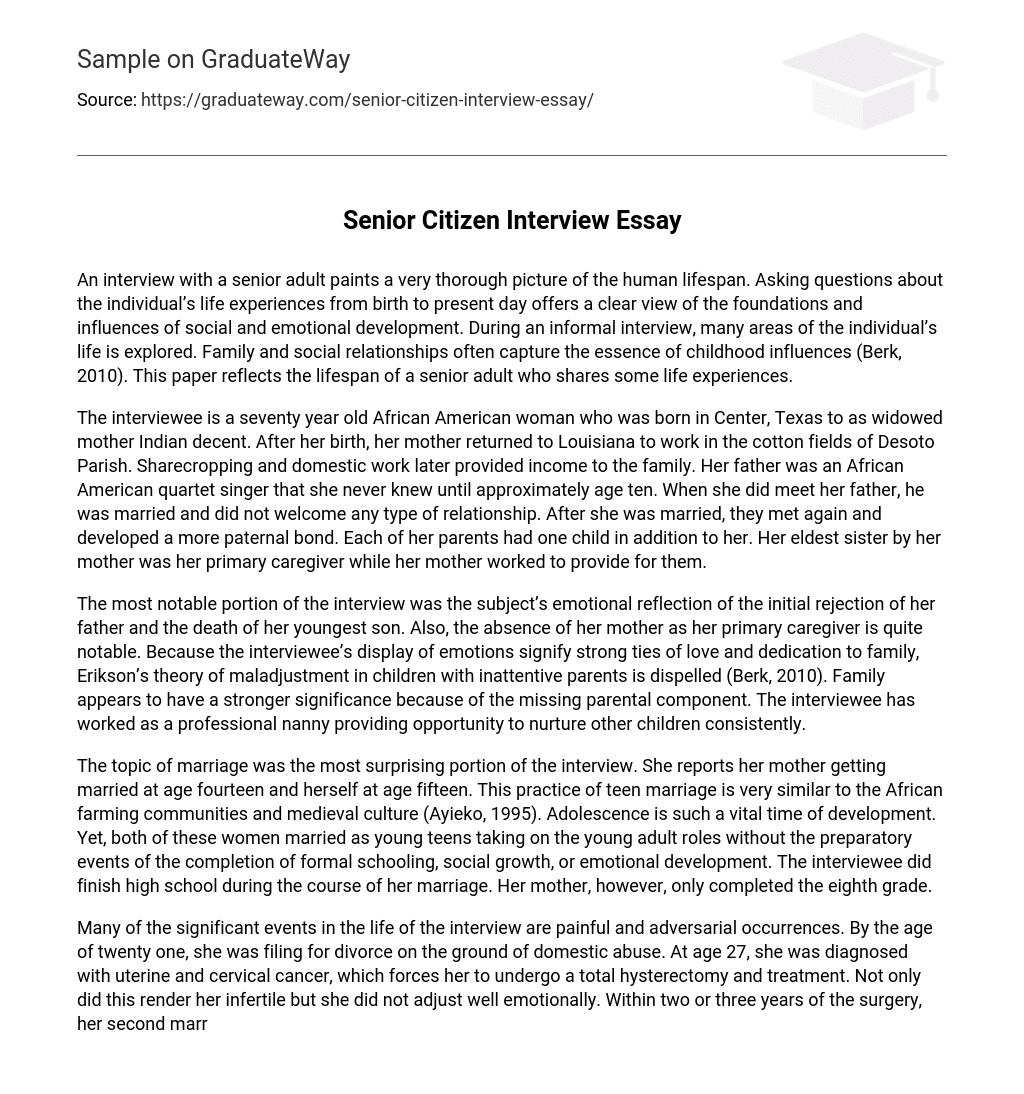An interview with a senior adult paints a very thorough picture of the human lifespan. Asking questions about the individual’s life experiences from birth to present day offers a clear view of the foundations and influences of social and emotional development. During an informal interview, many areas of the individual’s life is explored. Family and social relationships often capture the essence of childhood influences (Berk, 2010). This paper reflects the lifespan of a senior adult who shares some life experiences.
The interviewee is a seventy year old African American woman who was born in Center, Texas to as widowed mother Indian decent. After her birth, her mother returned to Louisiana to work in the cotton fields of Desoto Parish. Sharecropping and domestic work later provided income to the family. Her father was an African American quartet singer that she never knew until approximately age ten. When she did meet her father, he was married and did not welcome any type of relationship. After she was married, they met again and developed a more paternal bond. Each of her parents had one child in addition to her. Her eldest sister by her mother was her primary caregiver while her mother worked to provide for them.
The most notable portion of the interview was the subject’s emotional reflection of the initial rejection of her father and the death of her youngest son. Also, the absence of her mother as her primary caregiver is quite notable. Because the interviewee’s display of emotions signify strong ties of love and dedication to family, Erikson’s theory of maladjustment in children with inattentive parents is dispelled (Berk, 2010). Family appears to have a stronger significance because of the missing parental component. The interviewee has worked as a professional nanny providing opportunity to nurture other children consistently.
The topic of marriage was the most surprising portion of the interview. She reports her mother getting married at age fourteen and herself at age fifteen. This practice of teen marriage is very similar to the African farming communities and medieval culture (Ayieko, 1995). Adolescence is such a vital time of development. Yet, both of these women married as young teens taking on the young adult roles without the preparatory events of the completion of formal schooling, social growth, or emotional development. The interviewee did finish high school during the course of her marriage. Her mother, however, only completed the eighth grade.
Many of the significant events in the life of the interview are painful and adversarial occurrences. By the age of twenty one, she was filing for divorce on the ground of domestic abuse. At age 27, she was diagnosed with uterine and cervical cancer, which forces her to undergo a total hysterectomy and treatment. Not only did this render her infertile but she did not adjust well emotionally. Within two or three years of the surgery, her second marriage ended in divorce. As a single mother of four children, the financial and parenting difficulties seem to grow immensely. The family often received assistance from the Salvation Army and other community support agencies. Her oldest son quit school in tenth grade and began working as a janitor. The eldest daughter took the General Educational Development (GED) test. This allowed her to leave school early and take a job in a fast food restaurant. Each of the older children worked to help to provide for the younger siblings. Both younger siblings graduated high school.
As her children became adults, each one of them got married and started families of their own. There is significant joy in her demeanor as she describes the births of her grandchildren. During middle adulthood, the interviewee lived in the rental home where she reared her children and maintained social ties to her friends and Sunday school class members. She worked diligently providing mission services to the elderly and infirmed in her congregation. It is not until she slips, falls, and breaks her ankle that she must temporarily live with her eldest daughter. After surgery that required the placement of plates and screws in the ankle, she began to slow some of her physical activities because of falls. Her mother passed away around this time.
After reaching her 60’s, her older sister became ill. The interviewee care for her sister until her time of death. Her sister’s death brought financial hardship as she was uninsured. Shortly afterwards, the foundation on rental home where the interviewee lived shifted making it unsafe for habitation. Again, she found herself living with her eldest daughter. In the course of this time, her son becomes terminally ill and she assumes his care until death. She becomes very emotional on this subject so we discontinue this discussion. After a period of time, she chooses that she does not want to be burdensome to her daughter and moves into an elderly apartment where she continues to live presently.
She recounts the most challenging of life transitions was from marriage to single parenting four children. The lack of advance education or vocational training hindered her ability to provide many of the basic necessities. She attributes her faith and work ethic to successfully rearing children that are productive citizens. Each transition in her life was met with strong religious faith that she has tried to instill in her children.
The interview serves as evidence that even as science attempts to correctly categorize influences of physical, social, and emotional development as well as its deterrents, the resilience of humanity is astounding (Bohlin & Hagekull, 2009). The interviewee’s lifespan development is anything but textbook, including her birth to a single mother of advanced age without formal education. There is a marked absence of the adolescent stage of development. Her young adult life events more closely resembled middle adulthood responsibilities. Even her ability to meet the adverse challenges at the various stages of life without formal counseling is miraculous to say the least.





